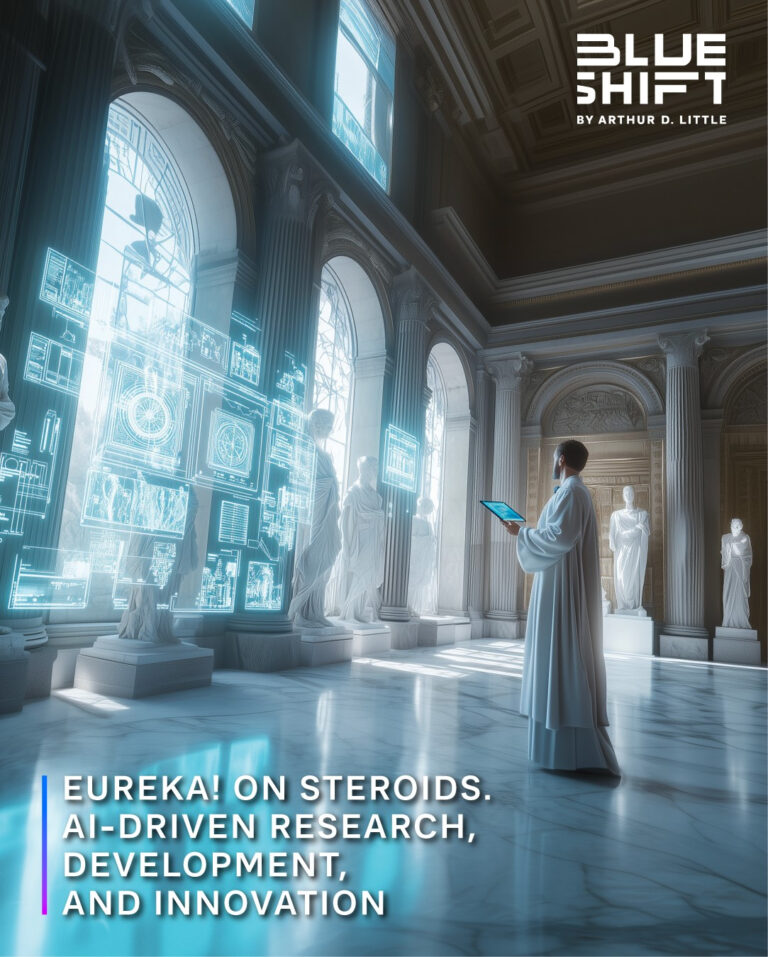Artificial Intelligence (AI) is revolutionising research, development, and innovation (R&D&I) by unlocking unprecedented productivity gains and solving complex challenges across diverse industries. Despite its growing adoption, the integration of AI into R&D&I processes is still in its infancy. Several challenges, including technological limitations, economic considerations, regulatory constraints, and societal concerns, continue to impede its widespread use. However, Arthur D. Little’s (ADL) Blue Shift Institute’s latest report, Eureka! on Steroids: AI-driven Research, Development, and Innovation, identifies six strategic actions organisations can take today to capitalise on AI’s transformative potential.
The report was developed in collaboration with leading organisations such as LVMH, Avril, GRTgaz, the French National Centre for Scientific Research (CNRS), and the French National Research Institute for Agriculture, Food, and the Environment (INRAE). It highlights how AI is already reshaping R&D&I processes and creating new opportunities for innovation.
AI’s Expanding Role in R&D&I
While AI has been a part of R&D&I for over a decade, recent advancements have accelerated its capabilities, enabling it to tackle complex problems and generate more frequent breakthroughs. The study underscores AI’s ability to:
- Enhance productivity by automating routine tasks and reducing human error.
- Accelerate timelines for research and development, ensuring faster time-to-market.
- Address previously unsolvable challenges in areas like climate modelling, drug discovery, and advanced materials.
The research draws from more than 40 expert interviews and a survey involving over 200 professionals from academia, startups, and corporations. It also features insights from Anne Bouverot, the French President’s Special Envoy on AI, highlighting the critical role AI can play in driving innovation across sectors.
Challenges and Opportunities
Despite its promise, AI’s integration into R&D&I faces hurdles related to trust, performance, and affordability. The report outlines six potential scenarios for AI’s adoption, ranging from limited applications in low-risk areas to full-scale transformation of the R&D&I landscape. Addressing these challenges requires strategic planning and decisive action.
Strategic Recommendations
To maximise AI’s impact, the report recommends six no-regret moves for organisations:
- Recruit and empower skilled AI talent to drive innovation.
- Build robust data infrastructures to support AI applications and ensure data integrity.
- Train employees in AI fundamentals to create a workforce that is future-ready.
- Focus on use cases that deliver immediate, tangible benefits and measurable outcomes.
- Share computational resources to optimise costs and improve efficiency.
- Implement governance frameworks to ensure quality, control, and ethical AI use.
A Call to Action
Dr. Albert Meige, Global Director of Blue Shift at Arthur D. Little, stated:
“R&D&I is essential to solving global challenges such as sustainability, health, and energy security. AI offers transformative potential to address these issues, and many organisations are already benefiting from its applications. By overcoming key barriers and taking proactive steps, businesses can harness AI to drive innovation and ensure long-term success.”
Paving the Way for the Future
AI is poised to play an even more significant role in the future, enabling industries to tackle pressing challenges with greater efficiency. By acting decisively today, organisations can secure a competitive edge while contributing to a more innovative and sustainable global ecosystem.


